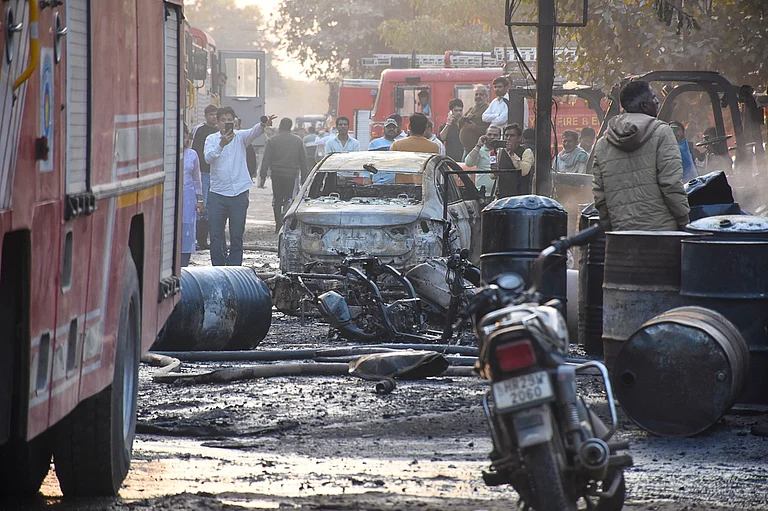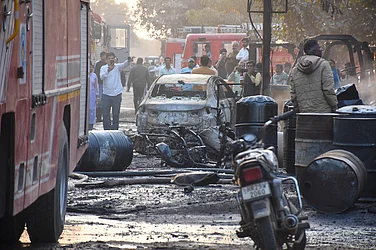FREE housing for Bombay's slum-dwellers was Shiv Sena chief Bal Thackeray's electoral plank in 1995 when the BJP-Sena combine stormed to power in Maharashtra. All of 40 lakh houses was what the Sena chief had promised. By 1997 this figure was trimmed down to 10 lakh homes, then to two lakh. And now chief minister Manohar Joshi has announced a less ambitious, albeit castle-in-the-air scheme of providing 50,000 houses before he goes back to the people in 2000. Bureaucratic circles already dismiss the scheme as a mission impossible which would require not only a huge financial input but also stretch the civic agencies.
Understandably, the latest scheme is being taken with a pinch of salt. So much so that environmental activists have decided it is not worth their time and effort to move the courts in this instance. They have studied and dismissed the scheme envisaged by the newly set up corporation, the Shivshahi Punarvasan Prakalp Ltd (SSPPL), as well as an earlier plan drawn up under the Slum Redevelopment Authority (SRA). Says Debi Goenka of the Bombay Environmental Action Group (BEAG): "We did not challenge the SRA in the courts, knowing it wouldn't take off. And now we see the government is trying to become a better businessman than the builder. But if builders couldn't succeed, we are sure the government, considered the worst kind of businessman the world over, won't."
The ambitious plan has received much flak since Joshi went public last week. The commonest of these criticisms is that the Rs 600 crore being provided as seed capital might simply go down the drain.
Bombay's BJP president, Kirit Somaiyya, has always been a severe critic of the housing scheme and, predictably, almost provoked a BJP-Sena row when he initially attacked the scheme. But now he points out that he was only voicing his personal reservations. Says he: "I did not oppose the Shivshahi Prakalp. I only sounded a note of caution. When a project worth hundreds of crores is to be completed within 12 months, one must be cautious about the outlay, the appreciation, the investment. After all, the scheme stands to benefit only one small section of the community when you should be planning for the whole state. So there should be no government liability and the scheme should be economically viable."
It was when differences between the Sena and the BJP cropped up earlier this year in the state government over whether the slum scheme should be implemented at all that the SSPPL was set up. After Thackeray worked out a compromise between the warring constituents of the government, a review committee decided that a new corporation, headed by housing minister Sureshdada Jain, should be set up.
THE new corporation will get Rs 300 crore each from the Maharashtra Housing and Area Development Authority (MHADA) and the Bombay Metropolitan Region Development Authority (BMRDA). With this seed capital, further funds will be generated from the market. Bureaucrats in both MHADA and BMRDA point out that the current proposal will put immense pressure on the organisations, forcing them to put their other commitments on hold. Incidentally, the former constructs housing for lower income groups while the latter carries out infrastructure repair in the metropolis.
Points out Congress MP Murli Deora, who is chairman of the parliamentary committee on finance: "This is the easiest way to get the state bankrupt. On the paid-up capital of Rs 600 crore, they are going to borrow heavily from the banks by providing guarantees from the state government. They know very well that they will not be around when the debts are called in. This is a scheme which will neither help the poor nor create new houses. It will merely destroy two agencies which are already in the business of construction and repairs by making their capital disappear."
Bureaucrats associated with the scheme also question its viability but have little leverage, given the chief minister's determination. Even Deepak Parekh, chairman of the Housing Finance Development Corporation, the only expert on the review committee, chooses to be tight-lipped, keen to stay away from any controversy. Even the garrulous Somaiyya now says, "My lips are sealed." But the issues he raised remain. Other than Manohar Joshi and Thackeray, the lone supporter of the scheme is housing minister Jain. He is convinced that the SSPPL will be able to build and deliver the 50,000 houses on 11.50 hectares of open unreserved land across Bombay in no time at all. It is a feat Jain finds undaunting: "It is technologically feasible. In 18 months, it is still possible to construct 200,000 houses but the cabinet has now restricted me to 25,000 through tendering and 25,000 to be financed by private builders."
Tongue in cheek, Debi Goenka agrees, but only on paper: "Theoretically, it is possible, yes. If you use pre-fabricated technology and you have the precision of a mechano set, you could put up hundreds of homes in two minutes flat. But will the building blocks all fit together at first try?" This is ridicule the chief minister does not take too kindly to: "You should know that it takes as much time to build 10 houses as it does to build one. We will complete the project in the time available to us."
But not, perhaps, with the infrastructure needed for such a vast housing project, especially water, electricity and sewage, aspects the government has not yet given much thought to. Says social activist Kaushal Sharma: "Quite apart from whatever mess the real estate market might be in, the scheme will turn Bombay into a tinder box in terms of health and hygiene."
Adds Goenka: "At the moment slum-dwellers use open drains and gutters or maidans as their toilets. When the infrastructure to support hygiene is worked into the cost, I think they might need a lot of money. What they should do is simply give security of tenure and title to the land that the slumdwellers are already occupying." Goenka notes that it might not be easy to get slumdwellers to hand over their homes and the land they live on in return for the pucca tenements.
One of the builders willing to participate in the government's scheme has his own doubts: "To what extent the scheme will be successful, no one can say. The economics of the marketplace will determine that. As will the nature of the political commitment to the project. The earlier cross-subsidisation failed merely because the cost of slum reconstruction was found to be unrecoverable from the market in view of the falling real estate prices." He says he is convinced that the new scheme will "take off to the extent that the government has the funds". This cautious note is echoed by other builders.
It is the failure of the Sena's earlier free housing project that has put a question mark on this scheme. It came a cropper because in a declining real estate market, builders who might have been keen to participate in the cross-subsidised scheme (wherein they could recover costs through free market sales of a section of the tenements built) refused to risk their money.
Moreover open, unreserved plots in the metropolis are rare and slumdwellers got wise to the real estate value they were sitting upon. They refused to vacate their dwellings. The Sena-BJP government responded by bulldozing some slums under the excuse that they were clearing Mumbai of Bangla-deshis. But as a later survey showed, the majority of these slumdwellers were Maharashtrians, followed by Hindi-speaking north Indians, with a smattering of South Indians.
The Sena had picked the northern Bombay constituency of BJP strongman Ram Naik for the purpose. Naik was considered a formidable candidate by all parties but as a result of the government's demolition drive, his victory margin in this year's Lok Sabha elections was severely dented. Not surprisingly then, the BJP's Bombay unit is suspicious of the housing scheme.
So what about Manohar Joshi's latest plans? Environmentalists may not be taking the issue to court, but slumdwellers have won a victory of sorts with the high court staying the scheme and directing the government to submit a note on its economic viability within two weeks. But Joshi is confident that despite these initial hiccups the project will be completed on time. Very few share his optimism.























